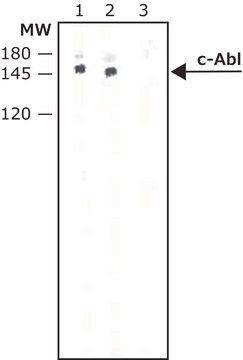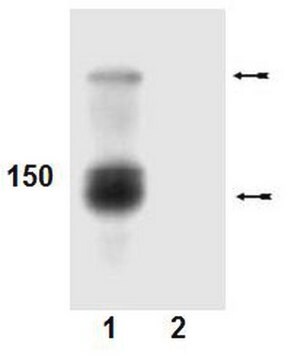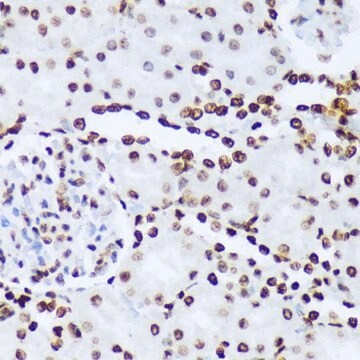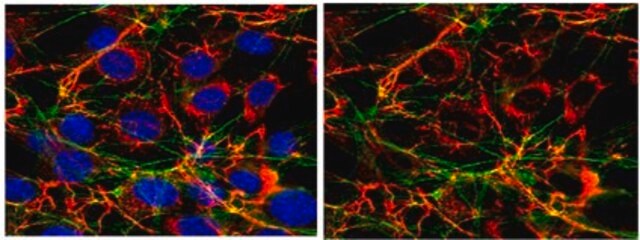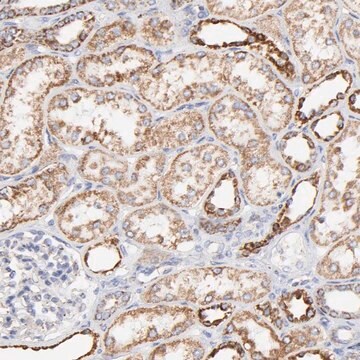추천 제품
생물학적 소스
rabbit
Quality Level
결합
unconjugated
항체 형태
affinity isolated antibody
항체 생산 유형
primary antibodies
클론
polyclonal
양식
buffered aqueous solution
종 반응성
human
기술
western blot: 1:1000 using fibroblasts transfected with oncogenic δSH3-Abl
UniProt 수납 번호
배송 상태
dry ice
저장 온도
−20°C
타겟 번역 후 변형
phosphorylation (pTyr412)
유전자 정보
human ... ABL1(25)
일반 설명
c-Abl is a proto-oncogene of the Src family of non-receptor tyrosine kinases. It is a cellular homologue of Ablelson murine leukemia virus, and is implicated in many important cellular processes and tumorigenesis. In mammalian cells, c-Abl is expressed ubiquitously but its localization within a cell depends on the cell type and the environmental signals. c-Abl has distinct SH2 and SH3 domains that indicate high affinity for tyrosine and proline residues. Complete activation of c-Abl requires phosphorylation at two tyrosine residues at 412 and 245. Some of the downstream targets of c-Abl identified are ATM, DNA-PK, BRCA1, and transcription factors p73 and RFX1. Several reports implicate c-Abl in Apoptosis, DNA repair, T cell development and neuronal development.
Anti-phospho-c-Abl [pTyr412] specifically recognizes c-Abl phosphorylated at tyrosine 412 (~140-150 kDa). The antibody detects human c-Abl. Mouse c-Abl (100% homology) and rat c-Abl is expected to cross react.
Anti-phospho-c-Abl [pTyr412] specifically recognizes c-Abl phosphorylated at tyrosine 412 (~140-150 kDa). The antibody detects human c-Abl. Mouse c-Abl (100% homology) and rat c-Abl is expected to cross react.
면역원
synthetic phosphopeptide derived from the region of c-Abl that contains tyrosine 412.
애플리케이션
Anti-phospho-c-Abl [pTyr412] may be used at a working dilultion of 1:1000 for immunoblotting in fibroblasts transfected with oncogenic δSH3-Abl. It may be used for immunodetection in HEK293 cells, cerebellar granule neuron cultures and primary cells from rat hippocampus. The antibody has been reported for immunoprecipitaion applications in HEK293T cells.
물리적 형태
Solution in Dulbecco′s phosphate buffered saline, pH 7.3, 50% glycerol,with 1 mg/mL BSA and 0.05% sodium azide
면책조항
Unless otherwise stated in our catalog or other company documentation accompanying the product(s), our products are intended for research use only and are not to be used for any other purpose, which includes but is not limited to, unauthorized commercial uses, in vitro diagnostic uses, ex vivo or in vivo therapeutic uses or any type of consumption or application to humans or animals.
적합한 제품을 찾을 수 없으신가요?
당사의 제품 선택기 도구.을(를) 시도해 보세요.
Storage Class Code
10 - Combustible liquids
WGK
WGK 1
Flash Point (°F)
Not applicable
Flash Point (°C)
Not applicable
Fabiola Rojas et al.
Frontiers in cellular neuroscience, 9, 203-203 (2015-06-25)
Amyotrophic lateral sclerosis (ALS) is a fatal neurodegenerative disease in which pathogenesis and death of motor neurons are triggered by non-cell-autonomous mechanisms. We showed earlier that exposing primary rat spinal cord cultures to conditioned media derived from primary mouse astrocyte
Jing Jin Gu et al.
Immunological reviews, 228(1), 170-183 (2009-03-18)
Stimulation of the T-cell antigen receptor (TCR) leads to the activation of signaling pathways that are essential for T-cell development and the response of mature T cells to antigens. The TCR has no intrinsic catalytic activity, but TCR engagement results
R Plattner et al.
Genes & development, 13(18), 2400-2411 (1999-09-29)
The c-Abl tyrosine kinase localizes to the cytoplasm and plasma membrane in addition to the nucleus. However, there is little information regarding a role for c-Abl in the cytoplasm/plasma membrane compartments. Here we report that a membrane pool of c-Abl
Jean Y J Wang
Nature cell biology, 6(1), 3-7 (2004-01-06)
Auto-inhibition describes the capacity of proteins to adopt a self-imposed latent conformation. Recently, a crystal structure of the Abl tyrosine kinase has revealed its ability to auto-inhibit. However, a separate body of work suggests that other cellular proteins also inhibit
Guilherme A P de Oliveira et al.
The Journal of biological chemistry, 288(39), 28331-28345 (2013-08-10)
c-Abl is a key regulator of cell signaling and is under strict control via intramolecular interactions. In this study, we address changes in the intramolecular dynamics coupling within the c-Abl regulatory unit by presenting its N-terminal segment (N-Cap) with an
자사의 과학자팀은 생명 과학, 재료 과학, 화학 합성, 크로마토그래피, 분석 및 기타 많은 영역을 포함한 모든 과학 분야에 경험이 있습니다..
고객지원팀으로 연락바랍니다.